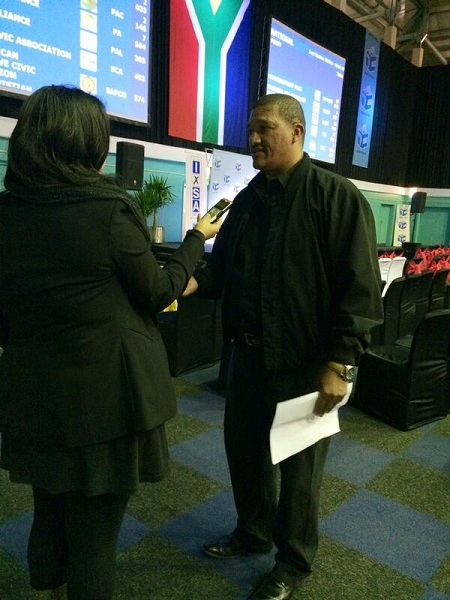People’s Assembly caught up with the DA’s Patricia De Lille and ANC’s Marius Fransman at the IEC Provincial Results Centre in Belville South to get their responses to the Western Cape's provincial results. By 5pm on Thursday approximately 90% of votes had been tallied in the Western Cape with the DA sitting on 59.5% and the ANC with 32.7%. In 2009 the DA got 51.46% and the ANC 31.55% of the votes.
Mayor de Lille told People’s Assembly she was please with the DA’s substantial increase of votes in the province. “We certainly worked hard in between the two elections in 2009 and 2014 and yesterday the voters had an opportunity to decide who must govern the province”, De Lille said.
“It seems they have overwhelmingly decided to give the DA a second chance so its now for us to pick up the programmes and projects we are busy with and continue to deliver to the communities of the Western Cape.”
Fransman was also pleased with the ANC’s performance in the province. “We now know we are doing better than the last elections so we can safely say we have increased our vote in the Western Cape since the last elections. We would have obviously wanted to get a majority, which we did not get but we must be pragmatic and know that out strategy has worked and we have consolidated our rural vote and increased it in some instances”, Fransman said.
“If you look at the Boland vote we have more than the 2009 [provincial] and 2011 [local] elections. We’ve taken Teewaterskloof. On the west coast in Swartland and on the farms we have consolidated. The challenge is obviously the metro and we think we have taken the townships but we are waiting for the actual percentages”, he added.

The ANC's Marius Fransman speaks to the ANC's performance in the Western Cape.
When asked why he though voter turn out was low in the Witzenberg municipality - an estimated 58.40%, the lowest in the province, compared to 75.07% in the City of Cape Town and 71.85% in Cape Agulhus - which includes Ceres, and De Doorns where farm worker wage strikes turned violence late in 2012 and at the beginning of last year, Fransman responded that there could be a number of reasons.
He added, “The bottom line is that there was a strong position on farms that people must come and work and they weren’t given off”.
When asked why she thought the ANC had improved overall and done especially well in the rural areas of the province, De Lille told People’s Assembly, “We have to look at the final results to look at the breakdown of where these communities come from. But its part of democracy if people are not happy or satisfied they have a choice to vote for any party and we have to respect that”.
With regards to the performance of smaller parties Fransman didn’t’ mince his words.
“We knew after the kiss of death from Zille to Mamphela, Agang must close up. They couldn’t even get any relevance in this election, not even nationally. COPE must close up. Terror Lekota has overseen a party that has moved from 8% to 1% and EFF didn’t even get what COPE got in that first election when COPE stood”.
Asked about the performance of the EFF in particular, which was sitting with 2% of the provincial vote after 90% of the ballots had been tallied, De Lille answered, “the EFF seems to have displaced most of the other smaller parties and taken some of that vote, especially some of the younger voters. They are new for the first time in the elections and I'm sure people said lets try them and that seems to be happening all over the country for them”.
Western Cape results are expected to be announced by the IEC’s Provincial Electoral Officer, Courtney Sampson, midday on Friday, 9 May. The final declaration is expected to be announced at the National Results Centre in Pretoria on Saturday, 10 May.


Comments
Keep comments free of racism, sexism, homophobia and abusive language. People's Assembly reserves the right to delete and edit comments
(For newest comments first please choose 'Newest' from the 'Sort by' dropdown below.)